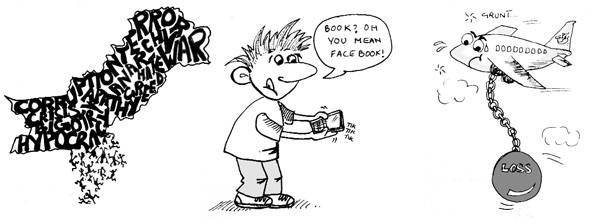
Blowing in the wind
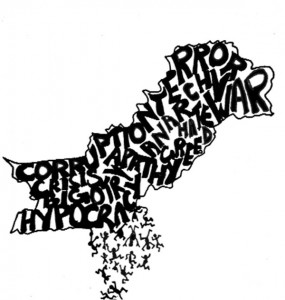
Sir,
On the 21st Ramzan I very prayerfully hazarded out to visit a relative. My daughter was in front seat and my three, foreign born and visiting briefly, little grandchildren were in the back seat. Two were belted down: there was no rear third belt. On asking the little one to sit back and still, the 4 year old on one side promptly came up with, “In Pakistan there are no seat belt laws!” I drove in flummoxed silence at this revelation from little kids used to being strapped into specific car seats from the first drive onwards.
With thin traffic as we drove towards the Metropole, I noted that from Aisha Bawany school onwards high encroaching walls and barricades lined much of Shahrah-e-Faisal to protect military residences and offices. The Cantonment Station road and the lane ahead were closed off by troops to safeguard the military elite’s front and back. As I turned towards Clifton the Qasre Naz State Guest complex area was similarly defended by Sindh protectors. Since the PIDC road leading to the CM’s House usually remains half closed it was probably safe to assume that our CM would take no chances on his own security on such a sensitive and high tension day.
These two disparate issues reflect what is wrong with Pakistan. I would request our Honourable Supreme Court, the military High Command, and our politicians if they can spare the time, to ponder the following:
Pakistan is fighting a war largely of its own making. Leaders, law enforcers and the military are also targeted, but most have the ability and obvious freedom to arm, protect and wall themselves into the best of the nation’s resources. The disintegration of the unprotected civic society: denied constitutional rights, looted, extorted, terrorized, even butchered, and now internally displaced by the hundreds of thousands, continues unabated. As collateral damage, and with only their Maker to turn to, is it surprising that we are an anarchic country with everyone for himself as the Law of the Jungle rules?
Even with attempts at civilized home upbringing, children grow watching their parents, peers and those around them being part of the all-pervading hypocrisy of our apathetic, corrupt and bigoted environment. It is these same children who will become the teachers, doctors, businessmen, mullahs, politicians, lawyers, judges and generals of tomorrow. In the absence of law and order will they be concerned about the niceties of civic sense and good governance when adult? What values will they uphold and can these conform to what is expected from constitutional civic society? The answer is blowing in the wind!
Dr Mervyn Hosein,
Karachi.
Unsung heroes
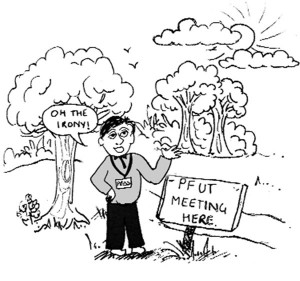
Sir,
August the 2nd, the Foundation Day of Pakistan Federal Union of Journalists (PFUJ), came and went without even a single commemorative event, or even a press statement.
It was on this day in 1950 that a group of highly professional journalists, many of whom later become the editors of leading newspapers, lay the foundation of the professional trade union, aiming to struggle for the freedom of the press, better working conditions, and to raise professional standards.
The initial meeting was planned at the Sindh Madrassa, but when journalists reached the site, they found out that the gates had been locked on the orders of the administration. The meeting was then held in a park.
A convention was then held at Khaliq Deena Hall, and was inaugurated by Sir Zafarullah Khan. A delegation from Delhi Union of Journalists also attended the ceremony. The constitution of the PFUJ was finalized after days of deliberations.
For the last 64 years, the PFUJ has been struggling for the rights of journalists, and has lost some great leaders in the process – from MA Shakoor to Israr Ahmad, from Nisar Usmani to Minhaj Barna and many unsung heroes as well.
The media is in golden chains today, and that has divided journalists, editors, and media owners. But we should all at least commemorate the sacrifices of our heroes and some of the golden chapters in our history.
Mazhar Abbas,
Karachi.
It won’t fly
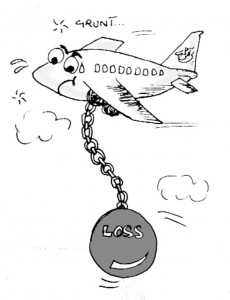
Sir,
When the PIA submitted a business plan for inducting B777 aircraft a while ago, it envisaged growth in revenue, expansion of routes and profitability by 2011. Instead, its accumulated losses escalated beyond Rs 200 Billion by end of 2013.
PIA’s fall from an airline of repute to disrepute is a direct consequence of incompetent corrupt cronies appointed by successive governments, their unethical practices, lack of accountability, and massive pilferage, and not because of commercial factors.
Public and state owned airlines like Ethiopian and Emirates have grown, and so have Etihad and Qatar, because their government appointed the best qualified team of professionals to run them, with a competent Board of Governors overseeing the executives and showing zero tolerance for revenue pilferage and financial or administrative irregularities.
The fact that PIA profits, fleet and routes recorded growth under Rafique Saigol and AM Nur Khan, only proves that given a good management with full powers, it can become an airline serving its clients and making money, instead of white elephant it has been reduced to by officials with conflicts of interest and a history of financial irregularities.
What PIA needs is a CEO with competence, integrity and experience of Tewolde GebreMariam of Ethiopian Airlines, Michael O’Leary of Rayaan Air, Craig Kreeger of Virgin Atlantic, or Tim Clark of Emirates, instead of the choice of semi literate cronies, or retired uniformed officers appointed by every successive government starting from Musharraf to Asif Zardari and now Nawaz Sharif. If PIA continues to post incompetent officials at key stations like Manchester, Birmingham, Toronto, and New York, then adding another 15 new aircraft on lease would meet the same fate as the induction of the B777 fleet.
What Pakistan needs are powerful independent regulatory bodies, enforcing financial and administrative discipline in both public and private sector enterprises, with a comprehensive system of inbuilt accountability and zero tolerance for organized corruption.
This cannot be achieved unless those involved in malpractices and on the payroll of PSM, PIA, and CAA are surgically eliminated with no exception.
Tariq Ali,
Lahore.
Good books
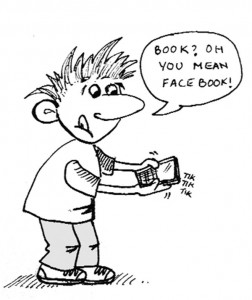
Sir,
Whenever I ask the young minds of our upcoming generation why they need to study literature, I am likely to get a response from them in the form of ‘drawing a blank’. I start pestering them to give some sort of an opinion over this question and the answers I do receive are generally instilled with words such as ‘pointless’, ‘useless’, ‘no good’ or even just a shrug that simply discards the entire subject altogether. And that’s a very hard blow to take for someone who is apparently teaching the subject with the idea that it is the most crucial stepping stone to broadening the horizons of these young learners.
As an advocate of the subject, I have observed the growing negligence towards Literature amongst my teenaged students. Or to be more precise, there is without a doubt a major lack of basic understanding of the subject. They all know why they need to study English Language but when it comes to the subject of Literature, their minds become foggy.
Since, according to me, this is a growing concern, and also in order to answer all those who raise the question ‘What is the point of this?’ I would like to create awareness among the youth regarding the importance of Literature.
Firstly, Literature is the kind of subject that gives one the freedom to relate to it in whatever way they choose to. As a subject, in Literature you may be assigned some ‘boring old novel’ to read and study and then answer questions regarding it. But a change of perspective is required in this regard. I have seen students trying to deal with Literature as they would deal with a mathematical problem, which is a horrifying spectacle. This is because students think that when they are given a question on the novel or story, there is one answer to it, which is not true (unless we are talking about comprehensions). Every single person can give his or her own understanding of what they have read and interpreted in regard to the writer’s idea behind the story and present it as a justified answer.
This is what Literature does to your mind. It makes you read, analyze and question the thinking of the writer whose story you are examining and then somehow relate to it. Once you have done that, you would find that you are giving your very own creative and analytical opinion as an answer. You thought hard over the writer’s perspective, deciphering the meanings behind his words, and then you linked your own ideology with it, therefore giving an answer that is your very own original and personal take on the writer and his or her story. You told us what you think about the text and in the whole ‘thought process’ of indulging yourself in reading between the lines, you unconsciously allowed the intellectual wheels of your mind to start rolling. This is what Literature does and this is why we study it. It grooms the intellect of a young and fresh thinker.
When you are reading books, drama, poetry, short stories, essays or any piece of literary work, you are opening the gateway to unbound imagination and allowing your intellect to grow by perceiving so many ideas out there, provided to you in the form of words. And then you are asked to dissect those words, question that piece of knowledge, examine that burst of idea, scrutinize the symbolic meanings, and critically analyze the writer’s philosophy. You start dwelling on human nature and the situations that we as beings find ourselves in, in this world. As a result, you develop a profound sense of life. Your mind becomes perceptive, knowledgeable, polished and one that sees the world with a deeper eye. That is the point of Literature.
Arshiya Kausar,
Lahore.
Bells and whistles
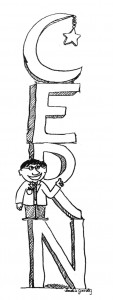
Sir,
Pakistan has reached a remarkable milestone in scientific research by becoming an associate member of the European Council for Nuclear Research (CERN). Pakistan is the first Asian country to that became an associate member and others are Turkey and Serbia.
Geneva-based CERN is world’s leading physics research centre that was founded in 1953 by twelve European nations. It leads the world in areas like particle and energy physics and had invented World Wide Web besides several other discoveries to its credit.
Pakistani physicists have remained actively engaged with CERN for a long time and the associate membership is recognition of their contributions to the Council, cutting edge scientific research and to the peaceful uses of nuclear technology. It is recognition that Pakistan is a responsible nuclear state with adept expertise in using civil nuclear technology for peaceful purposes.
Nobel Laureate Dr Abdus Salam was the first Pakistan scientist who worked with CERN in 1960s. Salam paved the way for some thirty Pakistani scientists who were actively involved in the discovery of the Higgs boson as been the subject of an intense scientific hunt.
This collaboration of Pakistan with CERN emphasizes the significance of scientific research and higher education for economic and technological development in Pakistan. With the associate membership, Pakistan will also get a student quota of around fifteen students.
There are several other benefits, such as developments in the field of science and technology will contribute in many other areas such as medicine, homeland security, industry, simulation of cancer treatments, reliability testing of nuclear weapons, food sterilization, nuclear waste transmutation, and scanning of shipping containers are by-products of physics research.
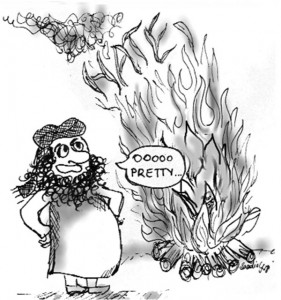 Hasan Ehtisham,
Hasan Ehtisham,
Islamabad.
Quote unquote
Sir,
In the Such Gup section of a recent issue of The Friday Times, the writer has mistakenly attributed a quotation to Shakespeare.
This often misquoted line is from the play The Mourning Bride (1697) by William Congreve (1870-1729). The quote is reproduced here:
Heav’n has no Rage, like Love to Hatred turn’d,
Nor Hell a Fury, like a Woman scorn’d.
Zulfiqar Ali Ramzi,
Karachi.
Height of hypocrisy
Sir,
A woman and two young girls were burnt alive and nine other people were injured when their houses were burned down on the eve of Eid in Gujranwala. They belonged to the minority Ahmadiyya community. This happened because of an accusation of blasphemy.
Pakistan’s controversial blasphemy law was enacted on 7th September 1974. The law has been abused and misused by half-baked religious leaders of various schools of thought, who take law in their own hands for the dispensation of on-the-spot justice, further aggravating violence and intolerance in a society already fighting many wars.
Pakistan was made for the Muslims of India to be able to freely and peacefully practice their religion without any discrimination, and this right was to be given to the religious minorities living in Pakistan as well. The founder of Pakistan, the Quaid-e-Azam, preached equal rights for all citizens, regardless of their cast, creed, or faith. But despite the fact that his speech in this regard is quoted repeatedly time and again, there is no visible sign of anyone following that principle at any level.
We moan the death and destruction in Palestine, the occupation of Kashmir, the extermination of Rohingya Muslim minority in Myanmar Burma, or the ban on veil in France, but we forget what is happening to the minorities – Christians, Hindus, Ahmadis or even the Kalash – in our own backyard.
Christians are fleeing Iraq – the cradle of Muslim civilization, and Hindus and Ahmadis are leaving Pakistan – the fort of Islam.
The state and its organs are silent in the face of hate-filled sights and sounds coming out of our mosques and seminaries, resulting in growing misconceptions about the rest of the world in the minds of the people who to go mosques to pray. The conundrum is that we carry out protests to sympathize with oppressed Muslims around the world, but are unwilling to give breathing space to our own minorities. That is the height of hypocrisy.
This is not only disturbing the demographic heterogeneity and religious harmony in the Muslim world, but in the broader context leading to our alienation in the international arena.
Abdul Ali,
Gilgit.

